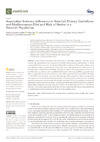Identificador persistente para citar o vincular este elemento:
https://accedacris.ulpgc.es/jspui/handle/10553/114267
| Campo DC | Valor | idioma |
|---|---|---|
| dc.contributor.author | González-Padilla, Esther | en_US |
| dc.contributor.author | Tao, Zhen | en_US |
| dc.contributor.author | Sánchez Villegas,Almudena | en_US |
| dc.contributor.author | Álvarez Pérez, Jacqueline | en_US |
| dc.contributor.author | Borné, Yan | en_US |
| dc.contributor.author | Sonestedt, Emily | en_US |
| dc.date.accessioned | 2022-03-31T09:40:43Z | - |
| dc.date.available | 2022-03-31T09:40:43Z | - |
| dc.date.issued | 2022 | en_US |
| dc.identifier.issn | 2072-6643 | en_US |
| dc.identifier.other | Scopus | - |
| dc.identifier.uri | https://accedacris.ulpgc.es/handle/10553/114267 | - |
| dc.description.abstract | Dietary factors associated with stroke risk are still rather unknown. The aim was to examine the association between adherence to healthy dietary patterns and incidence of stroke among 25,840 individuals from the Swedish Malmö Diet and Cancer Study cohort. Dietary data were obtained using a combination of a 7-day food record, diet questionnaire, and interview. A Swedish Dietary Guidelines Score (SDGS), including five dietary components based on the current Swedish dietary guidelines, and a modified Mediterranean diet score (mMDS), composed of ten dietary components, were constructed. Over a mean follow-up period of 19.5 years, 2579 stroke cases, of which 80% were ischaemic, were identified through national registers. Weak, non-significant associations were found between the dietary indices and the risk of stroke. However, after excluding potential misreporters and individuals with unstable food habits (35% of the population), we observed significant inverse association (p-trend < 0.05) between SDGS and mMDS and total and ischaemic stroke (HR per point for total stroke: 0.96; 95% CI: 0.92–1.00 for SDGS and 0.95; 95% CI: 0.91–0.99 for mMDS). In conclusion, high quality diet in line with the current Swedish dietary recommendations or Mediterranean diet may reduce the risk of total and ischaemic stroke. | en_US |
| dc.language | spa | en_US |
| dc.relation.ispartof | Nutrients | en_US |
| dc.source | Nutrients [eISSN 2072-6643], v. 14 (6), 1253, (Marzo 2022) | en_US |
| dc.subject | 32 Ciencias médicas | en_US |
| dc.subject | 3206 Ciencias de la nutrición | en_US |
| dc.subject.other | Cohort | en_US |
| dc.subject.other | Dietary Patterns | en_US |
| dc.subject.other | Healthy Diet | en_US |
| dc.subject.other | Mediterranean Diet | en_US |
| dc.subject.other | Stroke | en_US |
| dc.subject.other | Swedish Dietary Guidelines Score | en_US |
| dc.title | Association between Adherence to Swedish Dietary Guidelines and Mediterranean Diet and Risk of Stroke in a Swedish Population | en_US |
| dc.type | info:eu-repo/semantics/Article | en_US |
| dc.type | Article | en_US |
| dc.identifier.doi | 10.3390/nu14061253 | en_US |
| dc.identifier.scopus | 85126509732 | - |
| dc.contributor.orcid | NO DATA | - |
| dc.contributor.orcid | NO DATA | - |
| dc.contributor.orcid | NO DATA | - |
| dc.contributor.orcid | NO DATA | - |
| dc.contributor.orcid | NO DATA | - |
| dc.contributor.orcid | NO DATA | - |
| dc.contributor.authorscopusid | 57205764662 | - |
| dc.contributor.authorscopusid | 57491793200 | - |
| dc.contributor.authorscopusid | 57210287333 | - |
| dc.contributor.authorscopusid | 24586741900 | - |
| dc.contributor.authorscopusid | 36681870400 | - |
| dc.contributor.authorscopusid | 9640253600 | - |
| dc.identifier.eissn | 2072-6643 | - |
| dc.identifier.issue | 6 | - |
| dc.relation.volume | 14 | en_US |
| dc.investigacion | Ciencias de la Salud | en_US |
| dc.type2 | Artículo | en_US |
| dc.description.numberofpages | 15 | en_US |
| dc.utils.revision | Sí | en_US |
| dc.date.coverdate | Marzo 2022 | en_US |
| dc.identifier.ulpgc | Sí | en_US |
| dc.contributor.buulpgc | BU-MED | en_US |
| dc.description.sjr | 1,291 | - |
| dc.description.jcr | 5,9 | - |
| dc.description.sjrq | Q1 | - |
| dc.description.jcrq | Q1 | - |
| dc.description.scie | SCIE | - |
| dc.description.miaricds | 10,6 | - |
| item.fulltext | Con texto completo | - |
| item.grantfulltext | open | - |
| crisitem.author.dept | GIR IUIBS: Nutrición | - |
| crisitem.author.dept | IU de Investigaciones Biomédicas y Sanitarias | - |
| crisitem.author.dept | GIR IUIBS: Nutrición | - |
| crisitem.author.dept | IU de Investigaciones Biomédicas y Sanitarias | - |
| crisitem.author.orcid | 0000-0001-7733-9238 | - |
| crisitem.author.orcid | 0000-0001-5726-3731 | - |
| crisitem.author.parentorg | IU de Investigaciones Biomédicas y Sanitarias | - |
| crisitem.author.parentorg | IU de Investigaciones Biomédicas y Sanitarias | - |
| crisitem.author.fullName | Sánchez Villegas,Almudena | - |
| crisitem.author.fullName | Álvarez Pérez, Jacqueline | - |
| Colección: | Artículos | |
Citas SCOPUSTM
13
actualizado el 08-jun-2025
Citas de WEB OF SCIENCETM
Citations
16
actualizado el 08-feb-2026
Visitas
61
actualizado el 13-abr-2024
Google ScholarTM
Verifica
Altmetric
Comparte
Exporta metadatos
Los elementos en ULPGC accedaCRIS están protegidos por derechos de autor con todos los derechos reservados, a menos que se indique lo contrario.
